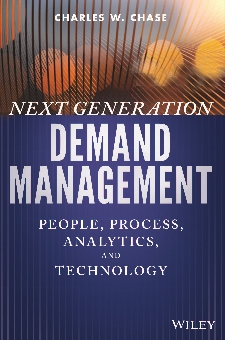My friend and colleague Charlie Chase, author of the new book Next Generation Demand Management, has developed a 2-day course to go along with the book. The course is part of the SAS Business Knowledge Series, and is being offered in Chicago, October 19-20. Here are the details:
Next Generation Demand Management: People, Process, Analytics, and Technology
Presented by Charles Chase, Jr., Advisory Industry Consultant, SAS Retail and Consumer Packaged Goods Global Practice
 This course focuses on the next generation demand management with a focus on people, processes, analytics, and technology -- with an emphasis on analytics -- that drive improved demand forecasting and planning within manufacturing companies.
This course focuses on the next generation demand management with a focus on people, processes, analytics, and technology -- with an emphasis on analytics -- that drive improved demand forecasting and planning within manufacturing companies.
With this two-day course you will be able to implement a multi-step demand management process and champion the critical shift in leadership to change the corporate culture necessary to drive adoption and accountability, while never losing focus on continually improving demand forecasting and planning excellence.
Commercial and demand forecasting professionals at large consumer products, electronics, sportswear, appliance, automotive, pharmaceuticals, and other related manufacturing companies, as well as retailers, can master the key principles of demand-driven planning, gain new analytics skillsets, and implement a demand-driven planning process that your company can implement to transition to the next generation demand management.
This course is a combination of lecture, demonstrations, and hands-on exercises using the latest SAS Demand-Driven Planning solutions. Students will be able to follow along with the instructor during demos that use the actual technology.
Learn how to
- develop the next generation demand management organization
- use demand sensing and pattern recognition to support a demand forecasting and planning
- define demand sensing, demand shaping, and demand shifting
- define data requirements, skill, and technology capabilities
- apply statistical modeling techniques, starting with moving averaging, exponential smoothing, dynamic regression, ARIMA, and ARIMAX methods
- interpret and apply causal models
- measure the effects of promotions (lifts)
- evaluate the adequacy of models
- build holistic models that account for key business drivers (demand signals) that influence demand (trend, seasonality, price, in-store merchandising, sales promotions, advertising, and more)
- apply consumption based models using a MTCA (Multi-tiered Causal Analysis) process to measure the push/pull effects of a company's business.
Who should attend
Supply chain directors, directors of demand forecasting and planning, demand managers, forecast managers, marketing analytics managers, demand planners, forecast analysts, marketing planners, and sales planners
